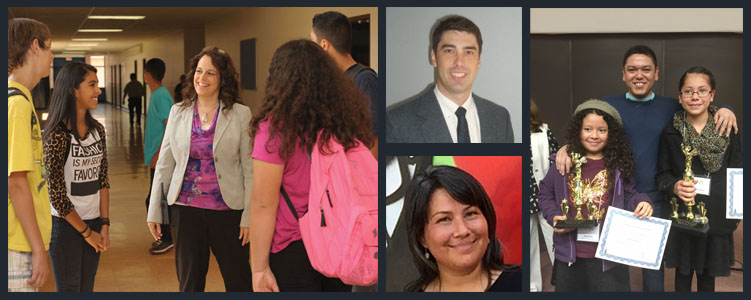News
From the Newsletter: WW MBA Fellows in New Mexico Focus on Transforming Schools

“A lot of times, people don’t understand the connection between business and education,” says Toni Hull, Principal of the Mesilla Valley Leadership Academy in Las Cruces, New Mexico. “In any business, the number one thing is relationships—it’s people. We’re building relationships with teachers, with our staff, with students.”
Dr. Hull completed an MBA at New Mexico State University (NMSU) as a member of the first class in New Mexico’s Woodrow Wilson MBA Fellowship in Education Leadership, a transformative new approach that blends a business school curriculum with education-focused content to prepare school leaders. NMSU and the University of New Mexico (UNM) are the Woodrow Wilson Foundation’s two WW MBA partners in New Mexico.
In a 2006 study, WW President Arthur Levine (then President of Teachers College, Columbia University) found that traditional school leadership preparation programs—the M.Ed. and Ed.D.—lack rigor. He proposed the MBA for school leaders as an alternative. The intent: Not just to strengthen academic credentialing, but, more importantly, to prepare leaders for the complex, rapidly changing systems, shaped by economic and social forces, that today’s—and tomorrow’s—schools represent.
“The Woodrow Wilson MBA program,” Dr. Levine said at the New Mexico program’s 2015 launch, “is specifically designed to provide a new generation of school leaders, equipped to transform all our schools into high performers.”
The Fellowship in New Mexico—one of three states (including Wisconsin and Indiana) to have partnered with Woodrow Wilson since the WW MBA’s 2013 inception—has named 65 Fellows to date. The two partner universities are creating new models of school leader preparation and engaging deeply committed school leadership candidates.
Consider, for instance, UNM Fellow Santiago Sanchez, a teacher at Sweeney Elementary School in Santa Fe who developed a new co-teaching model to improve his school’s dual language program, then worked with his principal to implement it. Due largely to these efforts, in 2015 Sweeney Elementary was named an Award School by the New Mexico Public Education Department. Mr. Sanchez is now in the middle of his WW MBA Fellowship year.
“At first I wasn’t sure how the MBA model was going to fit with my educational background,” Mr. Sanchez says. “I had the instinct that something needed to be done and done right. But I didn’t have any theory of action or background to make sustainable decisions. Now with this program I realize how important it is to combine policy, government, technology, and data… to guarantee the long-term quality of our work.”
Sean Barham, in the second group of Fellows at NMSU, already has administrative experience with the Las Cruces Public Schools and is working towards a school leadership position through the WW MBA. He finds the experience dramatically different from traditional ed school coursework: “We talk data all the time in the education world, but in the MBA program we’re really looking at the whole process—where the data comes from, how it’s put into the analytics, the whole picture. No way would we do that in ed school.”
Beyond quantitative expertise and policy context, the WW MBA Fellowship offers new opportunities to create equity and lead innovation, says Kimball Sekaquaptewa of the Santa Fe Indian School, whose Fellowship work at UNM is helping her develop her vision of technology as a tool for culturally responsive pedagogy. “The Woodrow Wilson program has really high ambitions to transform education at the systemic level. Schools aren’t designed for the Native student—in the worst times, they were designed to assimilate Native students. So minor changes to that system aren’t going to transform the educational experience of Native students. Education is the key to success for our communities, and the business approach focuses on how we think about programs—how we transform the system.”
Krista Savoca, the UNM program director, emphasizes the significance of the MBA opportunity for future leaders in New Mexico schools. “This is one of the poorest states in the country—sometimes things seem bleak. But when you learn the Fellows’ stories, you see how hard they’re trying and how they’re not giving up on anyone. The MBA is an expensive degree. This program gives them access to it that they wouldn’t otherwise have, and they are making the most of it.”
###
This story appeared in the fall/winter 2016 issue of Fellowship, the newsletter of the Woodrow Wilson Foundation. To see the full newsletter, click here.

